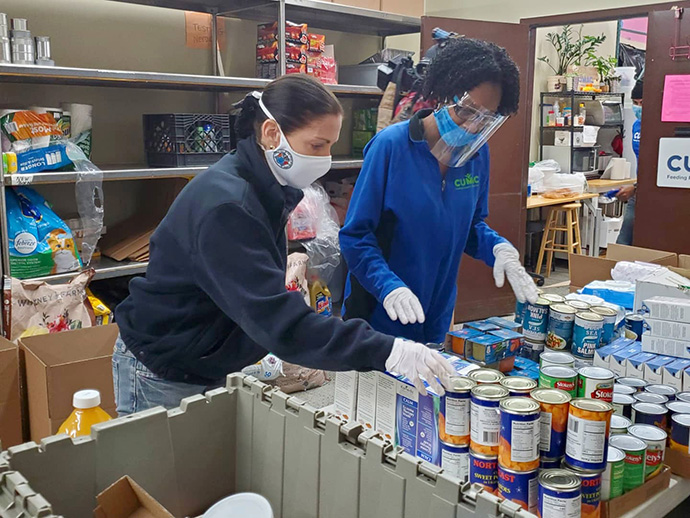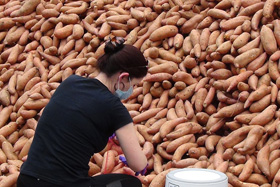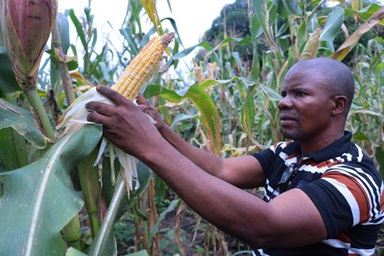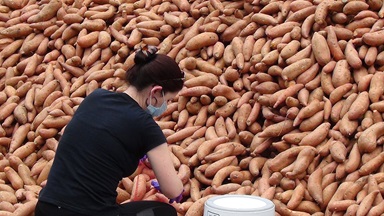Editor’s note: This is the first story in a three-part series about food security.
The staff and volunteers at a United Methodist-related food program in Paterson, New Jersey, have spent the past couple of years preparing for the coronavirus pandemic.
They just didn’t know it at the time.
When Mark Dinglasan arrived in 2017 as executive director of the CUMAC food program, his background in juvenile justice and diversity work helped him recognize that the longtime ministry started in a borrowed church closet had the potential, he said, to become “a trauma-informed one-stop access point for services” in that community.
Now, CUMAC has diversified sourcing for food supply, a team that is from and reflective of the community, a new development plan and an appointment-based system for customers.
The largest food distribution program in Passaic County, the program is one of 23 designated “Hope Centers” of the United Methodist Greater New Jersey Conference. Started in 1985 as the Center of United Methodist Aid to the Community Ecumenically Concerned Helping Others, the program simply goes by CUMAC now.
CUMAC switched into disaster-relief mode early, on March 7. The program saw a 23% increase in new clients in March and a 39% increase in April, when it served 3,297 individuals.

Dinglasan expects the program will serve a minimum of 3,600 individuals during the month of May. That’s just the frontline distribution and doesn’t include home deliveries and distributions to foster families and hospitals, he said.
Meanwhile, New Jersey has reeled from the pandemic, with COVID-19 caseloads and deaths higher than in any state other than neighboring New York and most other countries as well. As of May 18, there were 148,039 COVID-19 positive cases and 10,439 deaths.
Paterson itself — the state’s third largest municipality after Newark and Jersey City — has had 5,997 confirmed COVID-19 positive cases and at least 306 deaths.
But as new cases are on a downward trend, the economic and social after-effects — including access to nutritious food — will continue.
Advocating for more aid
While the Coronavirus Aid, Relief, and Economic Security Act included many important provisions to help people affected by COVID-19, more is needed, say advocacy groups.
The Washington Interreligious Staff Community, representing about 70 national religious organizations and denominations, is among those asking Congress to boost the Supplemental Nutrition Assistance Program maximum benefits by 15%; increase the minimum monthly SNAP benefit from $16 to $30 and suspend all administrative SNAP rule changes during a time of economic distress and long-term recovery.
John Hill, who oversees the advocacy work of the United Methodist Board of Church and Society, said the SNAP request “is similar to what happened during the Great Recession.”
Religious groups also are advocating for a minimum of $12 billion in U.S. aid for the international COVID-19 response. “With faith-based and NGO partners helping to facilitate food, water and medical distributions, the U.S. government and its thousands of partners are critical in preventing a windfall of other calamities,” the Washington Interreligious Staff Community said in its letter to Congress.
The SNAP expansion was included as part of the HEROES Act passed May 15 by the House of Representatives, along with other forms of emergency assistance, but not the international assistance.
The advocacy focus, particularly on the $12 billion or more for an international response, now shifts to the Senate, Hill said.
“I am hopeful that the long-standing bipartisan commitment to SNAP will continue and that the final package will provide a needed increase to SNAP benefits at a time when so many families are facing economic hardship because of the pandemic,” he told UM News.
Church and Society is launching a five-week webinar series on COVID-19 on May 21.
“Most people think the food security crisis is going to last at least another 18 months,” said Rick Reinhard, executive director of Greater New Jersey’s A Future With Hope community development program and a leader in the conference’s pandemic response. “It’s indirectly tied to COVID-19, but it’s directly tied to unemployment.”
The World Food Program has reported that the number of people facing acute food insecurity could rise to 265 million in 2020 as a result of the economic impact of COVID-19, nearly double the number in 2019.
Food-related ministries, a mainstay of United Methodist mission work, have provided a way for the church to respond to the pandemic, even as pews remain empty and other programs shuttered.
The United Methodist Committee on Relief has established the UMCOR COVID-19 Relief Fund to provide grants to help churches and partners assist vulnerable populations dealing with food security and other needs related to the pandemic.
This assistance is occurring around the world, including Europe, where markets and shops have reopened but prices have increased on many products, and restrictions on movement continue in some areas.
The United Methodist-related Miss Stone Center in Strumica, North Macedonia, still regularly assists about 200 people through its meals and home care ministry programs, reports Martin Konev, project manager. However, it is difficult and costly to purchase the disposable containers for the Meals on Wheels program needed in order to comply with hygiene regulations.
Albania has regional differences with regard to freedom of movement, based on infection rates. In the “green” areas, such as Elbasan, Pogradec and Librazhd, small groups of the United Methodist congregations may meet again.
Many Albanians — just recovering from the consequences of last November’s earthquakes — have now lost their jobs and income as a result of the coronavirus crisis. United Methodists are offering signs of hope and love by handing out food parcels.
Leaders of the United Methodist church in Cluj, Romania, are supporting five young women who have aged out of their orphanage, along with three young single mothers. In addition, about 30 Roma families in villages around Cluj-Napoca are receiving food and hygiene packages from the church — a relief action that is to continue in the coming weeks.
In the U.S., sudden unemployment has put a tremendous strain on the ability of some Oklahoma City residents to put food on the table.
Ending Hunger OKC — a food outreach ministry of St. Luke’s United Methodist Church — has responded by coordinating with various community partners to provide meals and fresh produce, said Lori Hall, St. Luke’s executive director of missions.
“We bring the food to the community by taking the Mobile Market truck into designated neighborhoods to hand out food free to those in need,” she explained. “By meeting people where they live, we have been able to provide over 2,000 families food every week during the COVID-19 crisis.”
Church members have donated more than $400,000 to support the food ministry since the pandemic began in March. “Two hundred new volunteers from our congregation and community have begun serving by driving a Meals on Wheels route, bagging produce each week, serving food at our Mobile Market or delivering food boxes to families in need,” Hall said.
A $250,000 grant from Oklahoma Gas and Electric has allowed St. Luke’s to support local restaurants as the church distributes food to Meals on Wheels clients and those served by the Mobile Market.
Expanding the reach of the food ministry program was a response to “God’s call to be the church,” said the Rev. Bob Long, St. Luke’s senior pastor.
In total, donations from Oklahoma Gas and Electric, the Bank of Oklahoma, the Rotary Club and the Chad Richison Family Foundation have helped the church serve over 8,000 hot meals weekly.
“We know these gifts have inspired so many, as our own family of faith have given immensely of their own money and time,” Long said.
United Methodists in the Greater New Jersey Conference also are being asked to give money and time, just as they did during Superstorm Sandy in 2012. This time, they are responding while living in an epicenter of the coronavirus outbreak.
How to help
The United Methodist Committee on Relief has established the UMCOR COVID-19 Relief Fund to provide grants to help churches and partners assist vulnerable populations dealing with food security and other needs related to the pandemic.
On May 5, Bishop John Schol announced an expansion of the conference’s Miracles Everywhere campaign to address COVID-relief efforts, including $500,000 for food security. The conference hopes to raise another $1 million to advance its food distribution system.
Ashley Wilson, director of mission for Greater New Jersey, is leading the conference’s effort to form a tight network “out of a very wonderful but decentralized system” of church-run food pantries.
Results from a questionnaire sent to all of the conference’s churches are being analyzed to determine the number of food pantries, what the programs looked like and what partners each program has. Part of the goal is to make sure “we are not duplicating any of the efforts that are already there and filling in some of the gaps,” Wilson said.
The survey information will provide short-, middle- and long-term plans as Greater New Jersey tries to connect the food pantries with additional resources.
In South Jersey, for example, people are phoning in orders to the ecumenical food pantry at St. Peter’s United Methodist Church and the staff is handling the contactless food deliveries. The Rev. Larry Oksten, St. Peter’s pastor, and Jennifer Bowman, a lay member, are part of the Ocean City NJ Care Project, which deals with COVID-19 needs in Ocean City.
Part of the challenge of dealing with food insecurity is that it cannot be either a short-term fix or a one-size-fits-all response, said Reinhard, who has been monitoring COVID-19 relief efforts at the federal and state levels.
Addressing food insecurity

Planning food distribution based on the recipient’s living situation, age and even access to equipment like a microwave or can opener is important. “The sort of food that needs to be given to a family of five is different than to seniors or to someone just released from the hospital,” he added.
Recently, 11 United Methodist churches were among the recipients of grants between $5,000 and $20,000 from the New Jersey Pandemic Relief Fund.
CUMAC, which also draws support from area United Methodist congregations, was one of those recipients. New Jersey first lady Tammy Murphy, the fund’s founding chair, paid a visit May 14 to its building in Paterson, where grab-and-go meals are available and refrigerated trucks are packed for deliveries.
The small state grant was helpful, Dinglasan said, but more important to him is that CUMAC “have a voice” in helping the area create a more just food system for Passaic County, one of the poorest in New Jersey.
To that end, he texted five nonprofit colleagues in mid-March about working on a joint response to the COVID-19 crisis. They said yes.
“I’m a comic book fan, so I jokingly call us the sacred defenders,” he said.
Bloom is the assistant news editor for United Methodist News Service and is based in New York. The Rev. Boyce Bowdon in Oklahoma and Urs Schweizer, assistant to Bishop Patrick Streiff, Conference of Central and Southern Europe, contributed to this report.
Contact Bloom at 615-742-5470 or newsdesk@umcom.org. To read more United Methodist news, subscribe to the free daily or weekly digests.
Like what you're reading? Support the ministry of UM News! Your support ensures the latest denominational news, dynamic stories and informative articles will continue to connect our global community. Make a tax-deductible donation at ResourceUMC.org/GiveUMCom.




